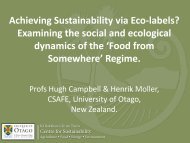Book of Abstract (incl. addendum) - IFSA symposium 2012
Book of Abstract (incl. addendum) - IFSA symposium 2012
Book of Abstract (incl. addendum) - IFSA symposium 2012
Create successful ePaper yourself
Turn your PDF publications into a flip-book with our unique Google optimized e-Paper software.
Workshop 2.2 Comparing the impacts <strong>of</strong> neoliberal and highly regulated approaches to<br />
agriculture on the balance between business, environmental and social objective<br />
instability. It makes clear how the drive by capitalist enterprise to expand the accumulation <strong>of</strong> capital<br />
from agricultural activities exacerbates an inherent tendency toward environmental damage and the<br />
inherent ecological instability <strong>of</strong> agriculture. And it suggests that the task <strong>of</strong> making agriculture and the<br />
food system ecologically sustainable is far more problematic than generally recognized.<br />
The Japanese farmers’ dilemma: Should pro-liberalization policies lead to<br />
structural transformation <strong>of</strong> the Japan Agricultural cooperative?<br />
Eniola Fabusoro, Makoto Maruyama and O.E. Fapojuwo<br />
Federal University <strong>of</strong> Agriculture, Nigeria<br />
Efabusoro@gmail.com<br />
Agriculture in Japan has witnessed consistent policy protection and support since the end <strong>of</strong> World II.<br />
The protectionist policy gave fairer trade and subsidy treatment to Japanese farmers than their<br />
counterparts in the Organization for Economic Cooperation and Development (OECD). The policy also<br />
created trade barriers in the Asia-Pacific region, placing very high tariffs on certain agricultural<br />
products such as rice and milk. However, since the changes in political dynamics in Japan in 1995,<br />
there has been a shift towards liberalization in the agricultural sector. This has implications for the<br />
structural transformation <strong>of</strong> Japan Agricultural cooperative (JA) whose role in political and trade<br />
negotiations sustained the protectionist policy. JA’s financial and trade businesses also enjoyed<br />
overwhelming support and protection from the government for about five decades. The policy changes<br />
also brought to the fore the need for agricultural competitiveness in the Asia Pacific and the need for<br />
Japan to join the discussion forum for the Trans Pacific Partnership Agreement (TPP). Japanese<br />
farmers are now left in a dilemma <strong>of</strong> retaining their inefficient, small scale production system or<br />
accepting the need for structural transformation <strong>of</strong> JA and facing the challenges <strong>of</strong> trade agreements.<br />
This paper examines this dilemma. Data for the study were collected through desk review and field<br />
level survey among the 2,914 regular and associate members <strong>of</strong> JA Oguni-go in Aso County,<br />
Kumamoto Prefecture, Southern Japan. The field survey involved responses <strong>of</strong> 91 farmers to a<br />
questionnaire, personalized interviews with 22 farmers and four JA/city <strong>of</strong>ficials and 12 focus groups<br />
representing each commodity group. The localization <strong>of</strong> the JA system could create competitiveness<br />
among local communities and the existing market network and the organizational strength <strong>of</strong> JA can<br />
also be utilized to overcome the dilemma and perform efficiently in the face <strong>of</strong> the changing policy.<br />
40











